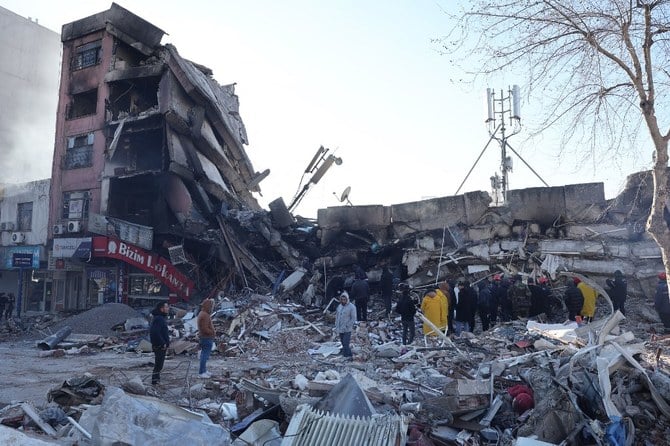
- ARAB NEWS
- 18 Jul 2025

I am writing this article full of sorrow and despair, after waking up to the catastrophic news of the massive earthquakes that struck my country and its neighborhood. In the early morning on Monday, a major earthquake with a magnitude of 7.8 hit southern Turkiye and northwest Syria just before sunrise and another 7.5-magnitude quake struck in the early afternoon.
Turkiye is facing an immense challenge, as the devastating earthquakes are among the deadliest in the recent history of the country, with thousands killed, while those who survived are struggling to hold on to hope in the freezing weather conditions. Natural disasters strike people at unexpected moments and not only cause huge pain and misery, but also leave permanent marks in the memories of people who survive them. The latest earthquakes triggered the collective trauma caused by the 1999 earthquake in northwestern Turkiye, which left 17,000 dead and destroyed thousands of buildings.
On Aug. 17, 1999, at 3:02 a.m., I was caught in that catastrophic quake on the fifth floor of an apartment building in Bursa, a city very close to the epicenter. As a child who had never heard the word “earthquake” before in her life, I could not give meaning to what was happening. I was terrified by the panic all around, anxiously waiting for my parents, who left me at my uncle’s house that night. For days, like everyone else, we could not get inside our homes, so we slept either in our cars or outside of our buildings. Those were the days we never wished to remember again.
The scenes of floating dust, collapsed buildings and human desperation seen in the aftermath of Monday’s earthquakes touched me deeply; but the stories of children who died or were rescued hit me even harder. They took me back to the terrible memories of 24 years ago. Aug. 17, 1999, was a date of devastation for Turkiye that caused great personal and material loss. However, Feb. 6, 2023, caused even greater grief, not only for Turkish people but also Syrians, giving both nations a sense of shared fate.
The initial reports indicate that the latest earthquakes are sadly going to reveal a worse picture than the 1999 earthquake
Sinem Cengiz
These two nations are battling to respond to this historic earthquake, although the full scale of the catastrophe will not be known anytime soon. Rescue teams from overseas are already being deployed in the affected cities of Turkiye, with considerable international support both material and moral. It is vital that this support continues in the coming weeks as the country strives to overcome both the material and psychological costs of the catastrophe.
History has shown us many times that common struggles as a result of natural disasters such as earthquakes can bind many wounds. Sympathetic and supportive messages from across the region have created a sense of solidarity at this much-needed time. This brought to mind Leo Tolstoy’s famous words: “If you feel pain, you’re alive. If you feel other people’s pain, you’re a human being.”
One needs not only feel for the Turkish people, but also for the Syrians too. The situation across the border in Syria is also dire and devastating. Syrians have been suffering from 11 years of continuous war and now they are left without even temporary homes. Their situation is described by the International Rescue Committee as “a crisis within multiple crises.”
Natural disasters are always a test for nations, but do countries draw lessons from these disasters? No place in this world is immune from disasters, whether earthquakes, floods or tornadoes. Turkiye is among the world’s most seismically active countries and it is at high risk of traumatic events, both natural and human-made. After the 1999 earthquake, Turkish people questioned institutions they had never questioned before and asked for the necessary changes to avoid the disaster being repeated. At the time, the authorities vowed to implement changes to the country’s building practices, institute new construction rules and ensure mandatory earthquake insurance for all buildings.
Although experts say it is too early to predict the losses at this stage, the initial reports indicate that the latest earthquakes are sadly going to reveal a worse picture than the 1999 earthquake. This heartbreaking disaster has shown us that there is something seriously wrong with the ways in which the country approaches or prepares itself for earthquakes. For years, experts have been calling for a cohesive strategy to prevent a catastrophe, warning that the rules are not being followed strictly enough. But their calls fell on deaf ears. This has increased the pain people are feeling and is fueling their anger.
The horrific number of people who have lost their lives is expected to increase, very sadly, while injuries, both mental and physical, are likely to remain for decades. My heart goes out to the people of Turkiye and Syria and all others affected by these horrific earthquakes. May the necessary lessons be drawn from this disaster to avoid such devastation being repeated in the future.